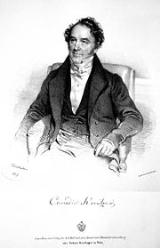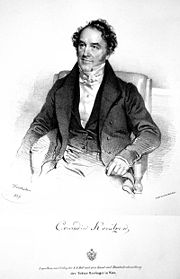
Conradin Kreutzer
Encyclopedia

Riga
Riga is the capital and largest city of Latvia. With 702,891 inhabitants Riga is the largest city of the Baltic states, one of the largest cities in Northern Europe and home to more than one third of Latvia's population. The city is an important seaport and a major industrial, commercial,...
, 14 December 1849) was a German
Germany
Germany , officially the Federal Republic of Germany , is a federal parliamentary republic in Europe. The country consists of 16 states while the capital and largest city is Berlin. Germany covers an area of 357,021 km2 and has a largely temperate seasonal climate...
composer
Composer
A composer is a person who creates music, either by musical notation or oral tradition, for interpretation and performance, or through direct manipulation of sonic material through electronic media...
and conductor. His works include the opera
Opera
Opera is an art form in which singers and musicians perform a dramatic work combining text and musical score, usually in a theatrical setting. Opera incorporates many of the elements of spoken theatre, such as acting, scenery, and costumes and sometimes includes dance...
for which he is remembered, Das Nachtlager in Granada
Das Nachtlager in Granada
Das Nachtlager in Granada is a romantic opera in two acts by Conradin Kreutzer. The libretto is written by Karl Johann Braun von Braunthal based on Johann Friedrich Kind’s drama Das Nachtlager von Granada....
, and Der Verschwender, both produced in 1834.
Kreutzer owes his fame almost exclusively to Das Nachtlager in Granada (1834), which kept the stage for half a century in spite of changes in musical taste. It was written in the style of Carl Maria von Weber
Carl Maria von Weber
Carl Maria Friedrich Ernst von Weber was a German composer, conductor, pianist, guitarist and critic, one of the first significant composers of the Romantic school....
, and is remarkable especially for its flow of genuine melody and depth of feeling. The same qualities are found in Kreutzer's part-songs for men's voices, which at one time were extremely popular in Germany, and are still listened to with pleasure. Among these Das ist der Tag des Herrn ("The Lord's Day") may be named as the most excellent. His Septet for winds and strings, Op. 62, remains in the chamber music
Chamber music
Chamber music is a form of classical music, written for a small group of instruments which traditionally could be accommodated in a palace chamber. Most broadly, it includes any art music that is performed by a small number of performers with one performer to a part...
repertory.
Kreutzer abandoned his studies in the law and went to Vienna about 1804, where he met Haydn and may have studied with Albrechtsberger, while he tried his hand unsuccessfully at singspiel
Singspiel
A Singspiel is a form of German-language music drama, now regarded as a genre of opera...
en. He spent 1811-12 in Stuttgart, where at least three of his operas were staged and he was awarded the post of Hofkapellmeister. Once he was successful, he became a prolific composer, and wrote a number of opera
Opera
Opera is an art form in which singers and musicians perform a dramatic work combining text and musical score, usually in a theatrical setting. Opera incorporates many of the elements of spoken theatre, such as acting, scenery, and costumes and sometimes includes dance...
s for the Theater am Kärntnertor
Theater am Kärntnertor
Theater am Kärntnertor or Kärntnertortheater was a prestigious theatre in Vienna during the eighteenth and nineteenth centuries...
and other theatres in Vienna
Vienna
Vienna is the capital and largest city of the Republic of Austria and one of the nine states of Austria. Vienna is Austria's primary city, with a population of about 1.723 million , and is by far the largest city in Austria, as well as its cultural, economic, and political centre...
, which have disappeared from the stage and are not likely to be revived. He was from 1812 to 1816 Kapellmeister to the king of Württemberg
Württemberg
Württemberg , formerly known as Wirtemberg or Wurtemberg, is an area and a former state in southwestern Germany, including parts of the regions Swabia and Franconia....
, and in 1840 became conductor of the opera at Cologne
Cologne
Cologne is Germany's fourth-largest city , and is the largest city both in the Germany Federal State of North Rhine-Westphalia and within the Rhine-Ruhr Metropolitan Area, one of the major European metropolitan areas with more than ten million inhabitants.Cologne is located on both sides of the...
. His daughter, Cecilia Kreutzer, was a singer of some renown.
Martin Heidegger
Martin Heidegger
Martin Heidegger was a German philosopher known for his existential and phenomenological explorations of the "question of Being."...
's Memorial Address, given on the occasion of the anniversary of Kreutzer's birth in their home town, registers the philosopher's enthusiasm for Kreutzer's work and legacy. The Address is notable for presenting in a way non-academics could understand Heidegger's distinction between calculative and meditative thinking and his ideas about the importance of autochthony to creative work and meditative thinking.
Selected works
- Die Alpenhütte, Oper (August von KotzebueAugust von KotzebueAugust Friedrich Ferdinand von Kotzebue was a German dramatist.One of Kotzebue's books was burned during the Wartburg festival in 1817. He was murdered in 1819 by Karl Ludwig Sand, a militant member of the Burschenschaften...
), 1 March 1815, Stuttgart - Libussa, romantische Oper (J K Bernard) 4 December 1822, Vienna, Theater am KärntnertorTheater am KärntnertorTheater am Kärntnertor or Kärntnertortheater was a prestigious theatre in Vienna during the eighteenth and nineteenth centuries...
- Melusina, romantische Oper (Grillparzer) 27 February 1833, Berlin, Königstädtisches Theater
- Das Nachtlager von Granada, romantische Oper (von Braun) 13 January 1834, Vienna, Theater in der Josefstadt

